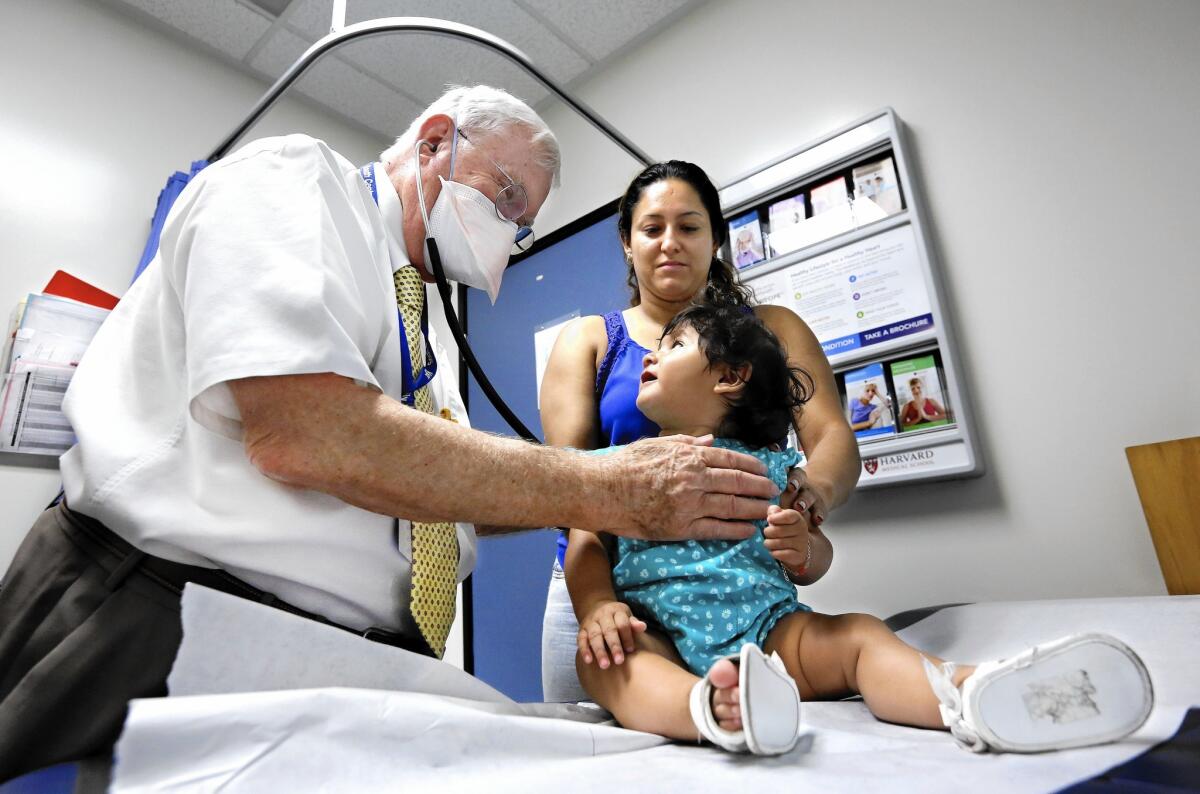With notecards instead of computer files, Dr. Mull makes the rounds early at South L.A. clinic

The line of patients starts to form outside South Central Family Health Center about 6:30 a.m.
By then, Dr. Dennis Mull has sipped his coffee, reviewed his labs and stuffed his shirt pocket full of pens and 3-by-5 notecards.
For 18 years, he’s driven from Irvine to South L.A. to serve a population with limited resources: patients who work multiple jobs to make ends meet, who lack health insurance and often show up knowing little about their medical history.
Al Johnson, the clinic’s security guard, comes in extra early each morning to let Mull into the building.
A few months back, “Big Al” was called into action when a few young men blocked the doctor’s entrance to the parking lot and threatened to damage his car.
“I don’t know what they were thinking,” said Johnson, who heard Mull blowing his horn that morning. “This is the doc. Nobody messes with the doc.”
At 77, Mull sees as many as 25 patients a day. He shuffles from room to room, a stethoscope draped over his shoulders, a walkie-talkie strapped to his waist.
“Buenos dias,” he greets the Spanish speakers, who make up the bulk of his patients. “Que esta pasando ahora?” What’s happening today?

For nearly two decades, Dr. Dennis Mull has been helping disadvantaged patients at South Central Family Health Center.
They come in with a host of chronic illnesses: diabetes, high blood pressure, asthma, heart disease. Others suffer from fevers, rashes or kidney stones.
“Dr. Mull won’t scold, he listens,” said Dr. Ruby Raya-Morones, the clinic’s medical director. “He doesn’t stop. He’ll get more done in six hours than many doctors will in eight.”
What he does, he does the old-fashioned way — without a computer. Awhile back, clinic staffers took his desktop away after they noticed he never used it.
“I used it,” Mull said. “To put all my Post-it notes.”
The truth is, the Harvard graduate — who’s led medical teams in Pakistan, Africa, Mexico and Saudi Arabia — has no clue how to use a computer. In the 1960s, when he first became a doctor, all a patient needed was a 3-by-5 card with his medical record written on it and $6 cash for the visit.
Now it’s a tangled, often bureaucratic process — all done through the computer.
“Technology changed, and I just wasn’t part of it,” Mull said.
He also can’t get his eyes to focus on the small print, even with a magnifying glass. So he counts on a young woman who types up in all his notes after each consultation.
There’s nothing I can think of that I enjoy more than what I do. Why would I give it up?
— Dr. Dennis Mull
On a recent morning, Mull did his rounds, whistling as usual as he dropped in to see patients.
In one exam room he found Alex Alonso, 8, feverish with bumps on his stomach, knees and elbows.
“His ears hurt a lot,” said his mother, Juana Ledezma.
Mull prescribed antibiotics for an ear infection and asked Ledezma to keep him home a few days.
The 27-year-old mom has been seeing Mull since she was 13.
“My mom, dad, sister, brother — my whole family comes to see him,” Ledezma said. “We feel very comfortable with him.”
Rose Rios has been going to Mull since he was first sent to the clinic by USC, where he worked as a professor.
He helps her with her blood pressure and annual checkups. She pitches in by helping the clinic with weekly food donations and vouchers.
Occasionally, hungry patients will come in. They’ll ask for vitamin supplements because they can’t afford food.
“Dr. Mull is like a doctor and daddy,” Rios said. “He’ll take money out of his own pocket and give it to them.”
Mull’s not one to say much about his good deeds. He’d rather talk about his colleagues, who do “all kinds of amazing things” — such as teach Zumba in their off time and help the homeless.
“We have one physician’s assistant who people love so much his portrait keeps disappearing from the hallway,” he said.
Unofficially, Mull plays doctor to many of the clinic’s employees. He keeps a shelf full of over-the-counter medicines to help them tackle colds and stomachaches.
The son of a salesman and a secretary, Mull began his career as a doctor during the Vietnam War, in which he served as a captain. He worked at a regional hospital helping South Vietnamese farmers who would arrive desperate — carrying relatives suffering from malaria, tuberculosis or leprosy.
“It was then I learned that I like taking care of very, very poor people,” he said.
When the opening came up at South Central Family Health Center in the late 1990s, he considered it a perfect fit. He’s received his share of more prestigious job offers, but he has stayed put.
He’s a morning person, he said, so the 6 a.m.-to-noon schedule suits him just fine.
So much so he has no intention of ever retiring.
“There’s nothing I can think of that I enjoy more than what I do,” he said. “Why would I give it up?”
esmeralda.bermudez@latimes.com
ALSO
Policy change: Even if you opt out, TSA can require you to go through body scanner
SoCal Gas pinpoints the site of a leaking well near Porter Ranch
Not only China’s wealthy want to study in America
More to Read
Sign up for Essential California
The most important California stories and recommendations in your inbox every morning.
You may occasionally receive promotional content from the Los Angeles Times.











